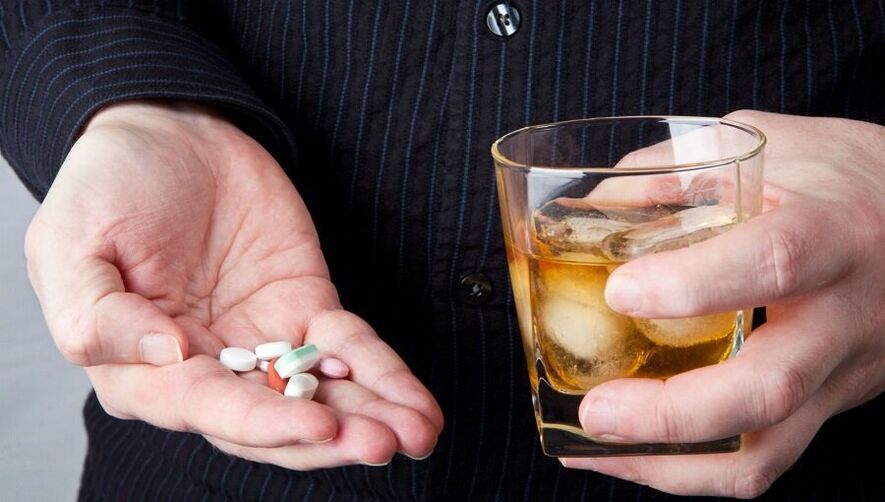Everyone knows that it is forbidden to combine alcohol and antibiotics, but very few people know when you can drink alcohol after antibiotics. It is not clear how many days to wait after the last pill. More and more people are wondering what will happen if you throw a few glasses during or immediately after treatment. With these questions, we will first try to understand that you need to get acquainted with the effects of alcohol and antibiotics on the body.

Alcohol treatment and contraindications
Antibiotics are not only very effective drugs, but also dangerous. Their reception must be agreed with the attending physician. The main indication of the need for use is the presence of a bacterial infection that the body can not cope with alone.
If a specialist prescribes antibiotics, you should follow some rules during such treatment:
- Strictly follow the timing and timing of medications that will maintain a constant concentration of certain substances in the blood.
- The doctor should determine how long it takes to take the medicine. Usually the course does not exceed 2 weeks, and some medications are enough to use for 3 days.
- It is recommended to take the antibiotic with clean still water.
- You must follow a proper diet during treatment. You should avoid fatty foods and, of course, alcohol in small amounts.
The latter rule should be taken into account, especially if you do not drink. In addition, it is forbidden to drink alcohol immediately for a certain period of time and after a course of treatment. So why not drink alcohol after antibiotic treatment? When ethanol and its constituents enter the body, they break down into simpler compounds. Some molecules of alcoholic beverages will begin to overlap with the molecules of drugs that can cause serious damage to the body.
It has been repeatedly proven that the effectiveness of antibacterial drugs decreases significantly after ingestion of alcohol. Moreover, such a mixture will put a heavy burden not only on the work of this organ, but also on the liver, which responds negatively to the condition of the body as a whole. Alcohol intake after antibiotics or during treatment can cause an unexpected reaction of the system and organs.
Possible results
As already mentioned, taking alcohol in one place or immediately after taking antibacterial drugs affects the whole body, is not limited to an individual area, so it is impossible to predict the consequences. But the most common are:
- If you drink alcohol when there are antibiotics in the body, an acute form of allergy may appear.
- A major danger when taking the drug is the exacerbation of intoxication and insomnia. Then a normal amount of drinking can lead to loss of control. At the same time, there is a risk of mental retardation as a result.
- Significantly reduces the therapeutic effect of alcohol after taking antibiotics, which can lead to repetition of the course of treatment or an increase in the dose of drugs that will adversely affect the body. In addition, increasing the dose of drugs helps to reduce their effects in the future and thus adapt the infection to the drug. As the antibiotic weakens, the infection finds time to intensify and resist. Thus, after a course of antibiotics, the infection will reappear over time, and stronger medications will be needed to eliminate it.
- Traditional symptoms such as headache, nausea, confusion, liver damage, and dizziness are also possible outcomes.
All of the above results can be avoided if you know when to drink alcohol after an antibiotic.
What deadlines must be met?
There is no clear explanation for how long alcohol can be taken after taking antibiotics. For each antibacterial drug, it is determined individually how many days after treatment you can drink alcohol, and it should be prescribed by a doctor. As a rule, this period is at least 10 days. This is the minimum time for a person's kidneys and liver to return to normal and for the intestinal microflora to recover. But these are general recommendations, it all depends on the characteristics of the organism.
If the patient has chronic kidney or liver disease, then the amount of alcohol consumed increases slightly. It is better to consult an expert on this issue to avoid mistakes. The more alcohol you do not drink after a course of treatment, the better for the body. After all, alcohol does not carry anything useful for the body, and at a time when it is even weaker.
Today, the main contraindications for alcohol consumption during antibiotic treatment and the general contraindications to abstinence have been studied.
By following these tips and guidelines, you will not only get rid of the disease quickly with the help of antibiotics, but also avoid harm to the body. However, it is important to remember that it is forbidden to take antibiotics without a doctor's prescription.
























